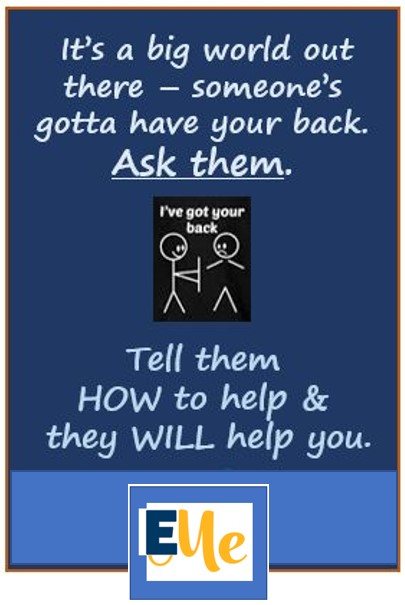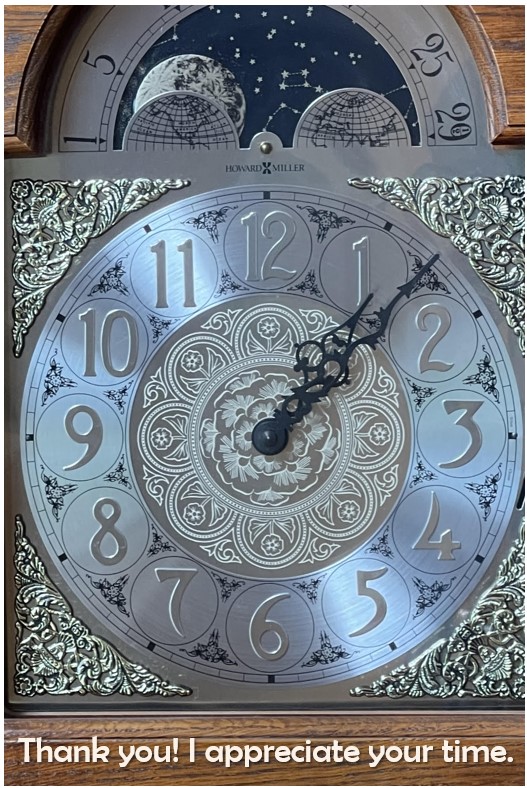The two most important words of appreciation a mentee can share with a mentor in return for their help and guidance: thank you. A thank you note is very simple to write or email, but if you feel there’s a better way to show appreciation, go for it! Give your mentor a boost for helping craft your mentorship plan and supporting you through the process. All mentors should know their efforts were appreciated. It demonstrates your emotional intelligence and your professionalism. Is it important? YES. If they showed up for you, say, “Thank you, Mentor.”

Thank you.
Two little words that, when used together, have a world of meaning.
Two little words that, when used together, create feelings of appreciation among friends and family members, and solidify business relationships.
Two little words that generations of people were told to use, expected to use, and taught how to use appropriately.

Thank you. The backstory.
Prior generations routinely wrote letters of thanks. Thanking someone for their hospitality, for a great dinner, a birthday gift, or a gift received for ANY other occasion, required a note of thanks.
It was expected. It was good etiquette. There were books on good etiquette, and “how to write a thank you note” had its own chapter.
Historically, people balked at any type of thanks that wasn’t written. However the world grew smaller, and technological advances opened up easier, faster, and more direct manners of communication. As a result, our schedules became busier, and work schedules became more demanding but also more flexible.
We began to rely less on post office deliveries and more upon other methods of following up with each other.
Moving away from a stamped envelope opened up many additional, helpful options.
- personal spoken thanks
- telephone call
- voicemail
- text
Regardless of what types of thanks you may have received in the past – or not – DO know your mentor deserves a sincere, formal expression of appreciation for the time they dedicated to you and for their efforts on your behalf.
Things have changed. Times have changed. The need to express gratitude has not.
Do I sound serious? I am.
Thank you for noticing. I appreciate you!

WHAT is a mentor? WHO is a mentor?
Technically, a mentor is someone you trust to advise on matters typically related to business or your path in life. This relationship may develop naturally or be part of a school or business training program.
Who is a mentor? Anyone can be a mentor.
Truly. We are all that good. We all have something to offer, and there are no qualifications for being a mentor. We are all experts in one area or another – and someone out there needs our help.
That said, if your mentorship results from a mentoring program set up at school or work, then it’s obvious: your mentor is part of a formalized program, and each of you has a defined role with expectations and probably time commitments set up around the partnership.
Informal mentorships often exist throughout our lives; though those relationships are often casual, they are also extremely helpful. If it’s a long-term relationship, do thank them. Likewise, do take the time to thank someone who has simply gone out of their way to help you, such as a friend with expertise, someone introduced as part of an offer to help you, or a senior colleague who set aside time to help you advance.
Become good at asking and being specific about how someone can help you.
People like to help those that are trying to help themselves.
If you are trying to grow your skills or figure out a problem or path, let them know you would appreciate their expertise, and more than likely, they’ll be happy and honored to help you accomplish your goal. They won’t do it for you. No one likes to be used, right? But being appreciated and assisting someone eager? Yes. Everyone benefits.

The good news: there is no best way to say “thanks.”
How was your mentorship experience? Maybe you describe your mentor as great, amazing, or The Best.
But what if your mentoring relationship wasn’t as positive? You may ask, “Do I still thank my mentor?” YES.
Again – expressing gratitude demonstrates grace, emotional intelligence, and professionalism.
Maybe this person didn’t meet your expectations. Maybe one of you was too busy, or you and your mentor couldn’t get your schedules aligned. Whatever the situation, if they acted as a mentor and did something on your behalf – or tried – then thank them.
It’s a good business practice. It brings that relationship to a professional closure and leaves you glowing in a positive light.
Your mentor may have helped with a specific need or with guidance that put you on the right path. I’ve spoken with mentors who had no idea how to help their mentee but wanted to give their time and help their partner be productive. You still may not realize how much your words of appreciation will mean to them.
Maybe you feel they didn’t help you, but they tried. If they gave you time, thank them.
Choosing the right words – kind words of thanks – goes a long way in helping strengthen that relationship – even if it was a temporary relationship for any of a million reasons – thanking your mentor matters. A lot.

How to write a thank you message
Format:
- Write or type out a note:
- Paper, a pre-printed thank you note, a card (can be serious, funny, blank)
- An email, text, or message through social media
- Order a card, print, or attach a picture
- Creativity and alternative forms are fine
The only actual rule: your thank you note must say: Thank you.
So you begin with: “Dear Mentor,” but then what’s next?
Your message to your mentor continues with:
- Thank you for your time.
- I appreciate your time. Thank you.
- Thank you for helping me discover my path.
- Thank you for your guidance.
- Thank you for teaching me.
- Thank you for always helping me figure out my next step.
- Thank you for helping me clarify my idea.
- Thank you for introducing me to someone.
- Thank you for improving my level of expertise.
- Thank you for proofreading my resume.
- Thank you for helping me research my idea.
- Thank you for helping me create my business plan.
Descriptive words might include, you are a/an:
- great mentor
- great role model
- great leader
- best mentor
- amazing mentor
Whatever fits your positive feelings and your relationship with this person. Choose what’s right for you if you want to add additional emphasis on what they mean or meant to you.

The gift of time is invaluable. Their participation in a mentorship is an investment in you.
Make the most of any time you receive. There is always a lesson learned.
Complete your note:
Add another line or two or three to include a more personal sentiment. It’s not a letter, it’s a note.
Yes – It CAN be a letter (but it can also simply be a note).
For example:
Example #1:
Dear Mr. Perkins,
I want to express my gratitude! You have been the best mentor. Thank you for everything – especially for helping me prepare for my first round of interviews. I was really nervous, and your support means a lot. Thank you for showing me additional formats for my resume and thank you for taking time to review mine to make sure it maximized my experience. I learned so many tips and definitely feel confident now that I know what I have to offer.
Thank you again for your guidance!
Kind regards,
Sam
Example #2:
Dear Coach Revel,
You taught me so much over the years, and especially over these past few months. Thank you for the direction and insightful tips on how to properly fill out my application, and for the recommendation you provided. I sent the application and learned today that I was accepted. You were with me every step of the way! Please know I appreciate you, and I am on the right path and will follow through as a successful, contributing member of their organization.
Have a great holiday!
~Sam
Maybe your assigned mentor from school or work became busy or didn’t realize what he/she signed up for. Maybe they suddenly didn’t have time to follow through as you expected or needed.
Regardless, of how this person spent time with you, it’s important to appreciate the time – it’s also very important long-term not to burn a bridge because when situations change, that person may become very helpful in your future professional life.
Example #3:
Dear Jen,
Thank you for making time to meet with me over the phone today. I realize our schedules are very busy, but I am grateful for your guidance and support, and for the insights into our expansion plan. Thank you for believing in me and helping me make the right decisions about my next step with the company.
Respectfully,
Denise
Again – The only rule is actually to say, “Thank you!”
A “thank you, Mentor” message needn’t be:
- Fancy
- A long note
- Any type of gift
- Any form of payment
- Anything owed
This is all unnecessary.
However, taking time to thank an excellent mentor with heartfelt words IS expected and typical.
Spoken or written words of thanks are absolutely necessary. No monetary payment is expected or typical of a mentor-mentee relationship. Gifts of any sort are not recommended. If you buy anything – buy the card. Cards can also be very expensive. They will not likely be saved, so just think that through. 2/$1.25 or from a pack of value thank you notes like the ones shown in this article are absolutely perfect, though also not necessary; you can just as well add a picture of a praying mantis saying, “thanks” to your email!
APPRECIATE EVERYTHING!
Express how grateful you are for their support and guidance.
SAY, “THANK YOU!”

0 Comments